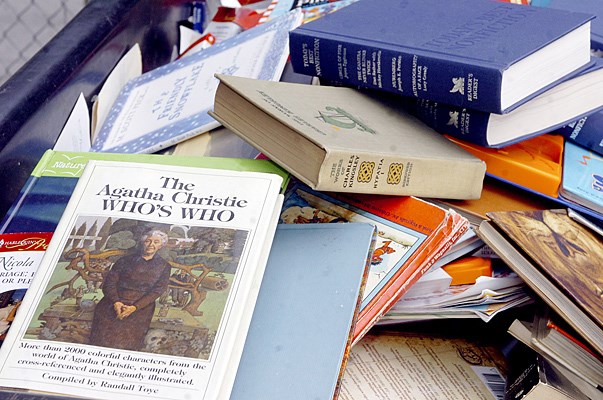B.C. businesses fear they will be writing blank cheques if they sign up for what they see as an murky and poorly explained province-[wide waste management program.
“It’s a circus,” John Winter, president and chief executive officer of the B.C. Chamber of Commerce, said Wednesday. “Nothing is clear.”
B.C. approved a regulation in 2011 that will shift the cost of recycling packaging and printed paper (PPP) from homeowners over to businesses that produce the materials and supply them to consumers.
Those businesses range in size and variety — from florists and fast-food places to newspapers and grocery stores.
Concerns have already prompted some changes to the program, slated to roll out May 19.
“It’s going through a major upheaval, another look-see,” Winter said. “It’s a very complicated thing.”
A new small business policy is being developed, consultation with communities and different sectors is coming and companies with less than $750,000 in gross revenues annually will not have any obligations under the program until May.
The program’s launch has been “abysmal,” Winter said, adding there was no consultation earlier. Letters were sent out in July warning that not complying could carry fines of up to $200,000.
A 94-page guide book for businesses is on the website of Multi-Material B.C. (MMBC), a non-profit industry organization with a B.C.-approved stewardship plan.
Many businesses have not heard of it, do not understand its rules and are being asked to participate without knowing what it will cost them, said Bruce Carter, CEO of the Greater Victoria Chamber of Commerce.
Companies are being asked to sign up “on faith” to be told later what they will be charged, he said.
Winter said the message from MMBC has essentially been “you’ve got to join us, trust us and, in effect, sign a blank cheque until we understand the magnitude of the industry.”
The Victoria Chamber launched a letter-writing campaign to Environment Minister Mary Polak criticizing the program. Winter has been meeting with Polak and MMBC officials.
Producers of PPPs are allowed to appoint another agency, such as MMBC, to manage to act for them.
So far, only 1,300 businesses have registered with MMBC. Chamber officials said there are close to 400,000 business licences in B.C. and about 14,000 businesses in Greater Victoria.
Carter said: “At this stage, it strikes me as a disaster for both businesses and consumers and it needs to be fixed.”
Allen Langdon, MMBC managing director, said he is sympathetic to concerns and wants to find ways for small businesses to participate without facing an undue administrative burden. The goal is to have a small-business policy in place early next year, he said.
Businesses that have submitted a letter of intent to take part are not being asked to register and report on their PPPs until the new policy is developed, Langdon said. Multiple consultations and online information sessions have been staged, he said. A fee schedule is expected to be released in November, once MMBC learns from participants how much packaging is going out, he said.
MMBC is dealing with companies that process materials that can be recycled. The organization has also put out offers to all B.C. municipalities providing curbside recycling and garbage collection, Langdon said. They have until Monday to send a letter of intent to join. He’s hoping to have agreements signed by Sept. 20.
The Capital Regional District accepted the offer of $4.797 million to cover the majority of the annual $5.165-million cost of running the local blue box and recycling systems, said Oak Bay Mayor Nils Jensen, chairman of the district’s environment services committee. The difference largely consists of the CRD’s education program, he said. From a consumer’s point of view, nothing will change, Jensen said.
WASTE MANAGEMENT
• Provincial regulations are shifting the cost of recycling from homeowners to what is called a steward. A steward is resident in B.C., supplies packaging and printed paper into B.C.’s residential market, and is a brand-owner, first-importer or franchisor of packaging or printed paper.
• Example: Let’s say a cookie is made and packaged in Ontario and is first imported into B.C. by a supermarket. As the first-imported, the supermarket is responsible for the packaging of the those cookies. But if a B.C.-based company manufactured and packaged cookies with its brand on the product, then it would be responsible.
• Multi-Material B.C. is a non-profit industry organization that has a stewardship plan approved by the province.
On the Web:
• Multi-Material B.C.multimaterialbc.ca
• B.C. Ministry of Environment: env.gov.bc.ca/epd/recycling/pack/ index.htm



